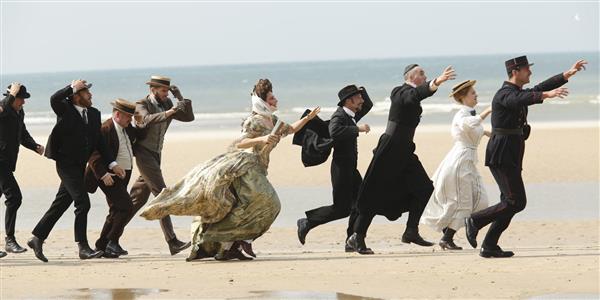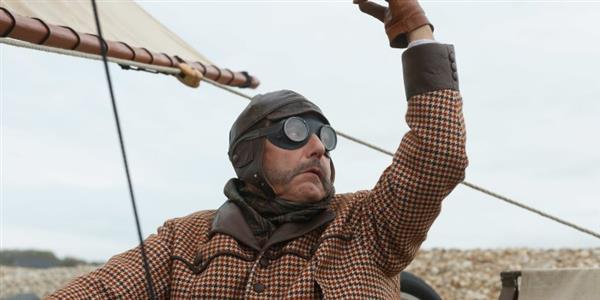SLACK BAY: Madcap… Or Simply Maddening?

Tomas is a chronic cineaste who studied English literature in…
Have you ever scrolled through Twitter reactions of films you recently watched? I’m guilty of doing this from time to time, more so because I am genuinely curious as to how others react to especially controversial or demanding films. After watching my screener of Bruno Dumont’s Slack Bay (aka Ma Loute in French), can you guess what the first thing I did was? Yup. I got onto Twitter, typed in the film’s name in the search bar, and scrolled until I was too tired to go any further.
What I found did not surprise me in the least: Slack Bay is as polarizing a film as you can get, with some appreciative viewers praising its unconventional absurdity, and others deeming it garbage and a complete waste of time. Dumont clearly knew he was going to be getting under a lot of people’s skins with this one, and for the first half hour, I thought I was going to be one of them. Fortunately, after getting used to the film’s peculiar tone, the film became much more amusing, and I ended up liking it far more than I initially thought I would.
All in the Family
Without giving too much away, the film is split between several subplots that eventually intertwine. One involves Inspector Machin (Didier Després), a detective who looks like a helium balloon (and even squeaks like one when he walks), and his ginger-haired partner Malfoy (Cyril Rigaux) investigating several suspicious tourist disappearances on the Channel Coast during the 1910 summer season. Their inquiries don’t get them very far—probably because Machin has a tendency to fall over and roll like an egg whenever touched—but they do set their sights on individuals in the neighborhood who come from two different social strata: the Bruforts and the Van Peteghems.

The Bruforts, led by a man called “The Eternal” (Thierry Lavieville), are a working-class family living in the fish district, farming shellfish and helping visitors cross Slack Bay at low tide (for a fee, of course). The eldest son, Ma Loute (Brandon Lavieville), eventually becomes smitten with Billie (Raph), the androgynous relation of André Van Peteghem (Fabrice Luchini).
Van Peteghem, a decadent aristocrat, owns a summer villa near the bay, called the Typhonium, where he stays with wife Isabelle (Valeria Bruni Tadeschi), daughters Blanche (Manon Royère) and Gaby (Lauréna Thellier), and maid Nadège (Laura Duprè). Later on, his sister—and Billie’s mother—Aude (Juliette Binoche) joins the party, as does Isabelle’s brother Christian (Jean-Luc Vincent).
Rather than giving us a typical Romeo and Juliet or Lady and the Tramp scenario, Dumont instead ramps up the strangeness to the surrealist pitch of someone like Luis Buñuel: with the exception of Billie, the Van Peteghems are utterly bonkers, victims of familial interbreeding. Meanwhile, the Bruforts have a gruesome secret of their own, so that the prospect of Billie and Ma Loute coming together holds more consequences than initially anticipated.
Expect the Unexpected
What really sets Slack Bay apart is Dumont’s commitment to undoing the conventionality of traditional period comedies. He keeps the ornate costuming and luscious cinematography, but throws us for a loop at every opportunity, mixing in elements of absurdism, magic realism, and broad farce so that the end result is one continuous (and, at times, unrelenting) gag. Most would prefer more subtlety; Dumont throws it out the window as early as he possibly can so that we are forced to confront a world that is totally out of our comfort zones.

Slack Bay, then, becomes something of an experiment, and like any ethical experiment, Dumont gives us the freedom to switch off if his conceit is too much. The first few moments are the perfect litmus test: we have Inspector Machin’s squeaking and pratfalls, Isabelle’s obvious neurosis, and André’s exaggerated, apelike gait and almost childish way of speaking. If these aspects prove too ridiculous for the casual viewer, they can move on to something more to their taste. Those who choose to stay on are those who have even the tiniest inkling of trust in the director.
However, the first half of the film holds no match for the whirlwind that is Juliette Binoche. Entering the film at the 40-minute mark in a preposterous feathered hat and butchering an operatic aria, she simultaneously sets your teeth on edge and makes you giggle uncontrollably as she flits and swoons everywhere and engulfs the screen with her presence.
So over-the-top and patently ridiculous is she that you could easily mistake it for an awful, misguided performance from a normally reliable veteran. Not so. Her performance of Aude is an embodiment of the film as a whole: a grandiose potpourri of style that teeters ever so close to the edge—but never manages to fall off completely. It is our trial by fire, except the flames are now a panoply of grotesques and impossibilities made true.
Time to Get Serious
We can’t write off Slack Bay as a silly little bauble. Even if its deeper meaning is liable to be lost on us amidst the deliberate garishness of Dumont’s style, there is still something fairly tragic about its setup. The Van Peteghems are clearly the derelict shadows of a once-great dynasty, ruined by their selfish desire to mutilate their genetics in the name of capitalistic interests. They are easy to laugh at, but that laughter is stymied a little when we are made to realize that they have essentially sold their souls for a few silver pieces.

The only exception is, of course, Billie, who is the sanest and therefore most accessible Van Peteghem. Billie is the exemplification of liminality, preferring to refute gender boundaries rather than sticking to one—hence why we are never sure whether Billie is a trans boy, a trans girl, or intersex (Dumont’s script is particularly adamant about maintaining the enigma). Billie simply is, a sympathetic figure trapped in the wrong era who finds Slack Bay a comforting locale because it, too, lacks a conventional boundary. The sheer simplicity of the scenario is the perfect respite from the general chaos of everything surrounding it.
The moment Billie is subjected to brutal violence is both the film’s most terrifying scene, and, unfortunately, also its worst. Even though, in the context of a society hostile to queer figures, the scene makes logical sense, Dumont’s mistake is to make it the sole instant of rupture, so that it will undoubtedly trigger the unsuspecting. It is traumatic, deeply upsetting, and very careless, considering it is bookended by a bevy of slapstick and farce. It does not sink the film, since the ending restores a sense of balance, but it keeps it from being a truly great one.
Conclusion
At the end of the day, Slack Bay will give back only as much as you put into it. If you choose to abandon it early on (in either the literal or figurative sense), then your impression will most certainly be unfavorable. An open mind and a willing heart are needed to appreciate Dumont’s unique brand of zaniness, and truly, it’s a lot of fun when the initial peculiarities settle. It’s not, in my mind, an instant masterpiece, or anything close to it—I think Dumont needs to do more trial and error before he can fully perfect his method. Slack Bay is but a mere stepping stone toward that point… but oh what a delightful one it is!
What are your own experiences with deliberately demanding films?
Slack Bay is out in U.S. theaters (a U.K. release is yet to be determined). For more international release dates, click here.
Does content like this matter to you?
Become a Member and support film journalism. Unlock access to all of Film Inquiry`s great articles. Join a community of like-minded readers who are passionate about cinema - get access to our private members Network, give back to independent filmmakers, and more.
Tomas is a chronic cineaste who studied English literature in university (in both the undergraduate and graduate levels), and hopes to pursue a career in writing. His passion for film began in earnest at the beginning of the 2010s, and since then he's been reveling at the vast horizons of the cinematic landscape like a kid at the proverbial candy store.













